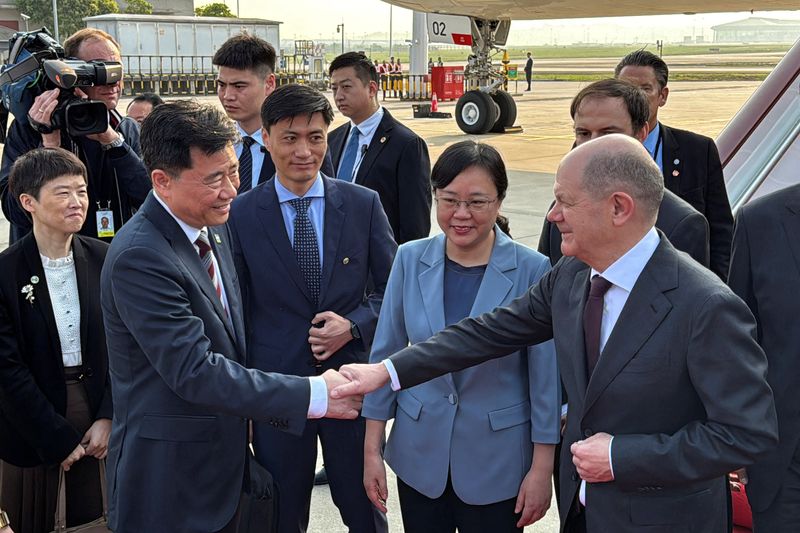By Andreas Rinke and Sarah Marsh
CHONGQING/BERLIN (Reuters) – Chancellor Olaf Scholz kicked off a three-day tour of China on Sunday to strengthen ties with Germany’s biggest trading partner and resolve differences over issues including Chinese trade practices and support for to Russia.
The Chancellor’s longest visit to any state since taking office is likely to be overshadowed by Iran’s attack on Israel, and he is also under scrutiny as Germany supports the European Union’s investigation into Chinese state subsidies for electric vehicle manufacturers, which has emerged as a controversial issue.
Scholz, who is traveling with several German CEOs, began his trip in the southwestern megacity of Chongqing. He will also travel to Shanghai and Beijing where he will meet Chinese President Xi Jinping and Premier Li Qiang.
Upon arrival, Scholz condemned Iranian attacks on Israel “in the strongest possible terms,” his spokesman said. Scholz was briefed during the flight on developments in the Middle East, government sources said.
German officials said Beijing could play a positive role in cooling rapidly rising tensions in the Middle East.
China played a mediating role between Iran and Saudi Arabia last year, and Reuters reported that China had asked Iran to help curb attacks on shipping in the Red Sea by the Iranian-backed Houthis, to do not risk damaging trade relations with Beijing.
However, Berlin’s general position towards China has become more critical after the war in Ukraine.
Last year, Germany also published its first China strategy, describing “unfair practices” and risks to supply chains in a potential conflict over Taiwan, and urging “risk reduction.” However, efforts to diversify away from China are so far patchy.
Scholz will visit German automotive supplier Bosch’s hydrogen fuel cell plant in Chongqing on Sunday, highlighting an area of growing tension.
The EU is conducting several investigations into whether Chinese exports of green technology, such as battery electric vehicles, which it says have benefited from state subsidies could harm local manufacturers.
The German auto industry fears these investigations could lead to a trade war that could damage their prospects in the world’s largest car market.

Scholz is also expected to address China’s support for Russia. German officials on Friday bluntly said that Beijing’s support and exports to Russia are allowing Moscow to wage a war of aggression in Ukraine and causing a “growing loss of reputation for China” in Europe and beyond.
“It’s about the fact that China does not support Russia in its brutal war against neighboring Ukraine,” Scholz wrote in a post on the social media platform X on Saturday.